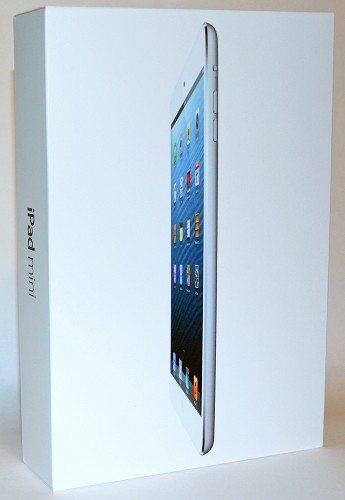 Despite what Steve Jobs so vehemently declared, Apple has just released a smaller version of the iPad. Well, I guess technically Steve said Apple would never release a 7″ tablet, and the iPad mini is a 7.9″ tablet, so Apple didn’t quite make a liar out of him. I already had the “new iPad”, and I wasn’t planning to buy the mini (nor the 4th-gen iPad with Retina display), but I was intrigued by the thought of having a tablet that could use all the hundreds of iPad/iPhone apps I own and that was small enough to fit inside my smaller purses. When I was told that I might need an iPad mini for a job, I decided I’d order the cheapest model. I received a 16GB white iPad mini on release day, and I used it until Tuesday evening, when I took it to the Apple store and returned it. I wasn’t unhappy with it. I just needed to turn the 16GB size in for one with more storage. I’m now the proud owner of a 64GB iPad mini. I also bought a Smart Cover while I was at the store, which I’ll also discuss in this review. Let me tell you why I decided to upgrade for more storage.
Despite what Steve Jobs so vehemently declared, Apple has just released a smaller version of the iPad. Well, I guess technically Steve said Apple would never release a 7″ tablet, and the iPad mini is a 7.9″ tablet, so Apple didn’t quite make a liar out of him. I already had the “new iPad”, and I wasn’t planning to buy the mini (nor the 4th-gen iPad with Retina display), but I was intrigued by the thought of having a tablet that could use all the hundreds of iPad/iPhone apps I own and that was small enough to fit inside my smaller purses. When I was told that I might need an iPad mini for a job, I decided I’d order the cheapest model. I received a 16GB white iPad mini on release day, and I used it until Tuesday evening, when I took it to the Apple store and returned it. I wasn’t unhappy with it. I just needed to turn the 16GB size in for one with more storage. I’m now the proud owner of a 64GB iPad mini. I also bought a Smart Cover while I was at the store, which I’ll also discuss in this review. Let me tell you why I decided to upgrade for more storage.
Most images may be clicked for a larger view.
If you’ve read my reviews, you’ll know I’ve had an iPad since the day the first one was released. You’ll also know I love them, and I especially love the Retina display on the “new iPad” that was released earlier this year. When I heard that the iPad mini wouldn’t have a Retina display, I was very disappointed. I thought that would be a deal-breaker for me, and I had no intentions of buying one until I learned I might need one for a job. As I said, I bought the cheapest model possible because I thought I probably wouldn’t use it after the job was completed. I did like the idea of having a tablet small enough to fit in some of my smaller bags, but I didn’t relish the idea of going back to the lower screen resolution.
The iPad mini is just another iPad, so far as its ability to run apps. Some of the internal components, like the screen and processor, are a step backwards to the components found in the iPad 2. Others, like the front and back cameras, are the same components used in the new iPad with Retina display. Because it is so similar to its bigger brothers, I’m going to concentrate on comparing the iPad mini with my 3rd generation iPad.
Technical specifications
- Size: 7.87″ X 5.3″ X 0.28″; 0.68 pounds (10.9 ounces)
- Storage: 16, 32, or 64GB
- 802.11a/b/g/n Wi‑Fi (802.11n 2.4GHz and 5GHz)
- Bluetooth 4.0 wireless technology
- 7.9‑inch (diagonal) LED-backlit Multi‑Touch display with IPS technology
- 1024-by-768 resolution at 163 pixels per inch (ppi)
- Fingerprint-resistant oleophobic coating
- Dual-core A5 chip
- Front camera takes 1.2MP photos and 720p HD video. FaceTime calling over cellular or WiFi
- iSight back camera take 5MP stills and 1080p video
- 16.3-watt-hour rechargeable lithium-polymer battery with 10 hour battery life
- New Lightning connector
In the box
- 5W charger (same as the one shipped with the iPhone 5)
- Lightning cable
- User brochure and Apple stickers
Hardware and use
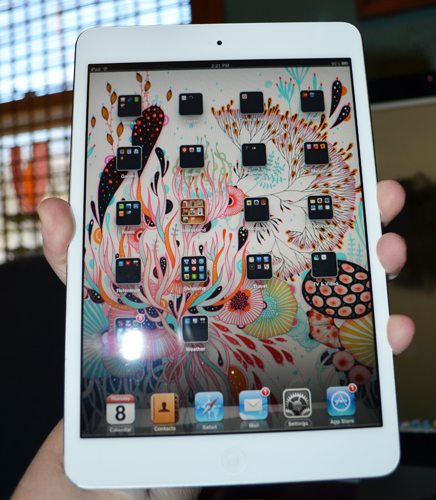 The first thing I noticed when I lifted the mini out of the box was how tiny and how light it is. Although it’s actually almost twice the weight of my Sony PRS-T1 eBook reader, holding the mini felt more like holding an eInk eBook reader instead of a tablet. It’s small – so small I could actually hold it one-handed. I don’t have the world’s longest nor strongest fingers, so I couldn’t hold it like that for hours, though.
The first thing I noticed when I lifted the mini out of the box was how tiny and how light it is. Although it’s actually almost twice the weight of my Sony PRS-T1 eBook reader, holding the mini felt more like holding an eInk eBook reader instead of a tablet. It’s small – so small I could actually hold it one-handed. I don’t have the world’s longest nor strongest fingers, so I couldn’t hold it like that for hours, though.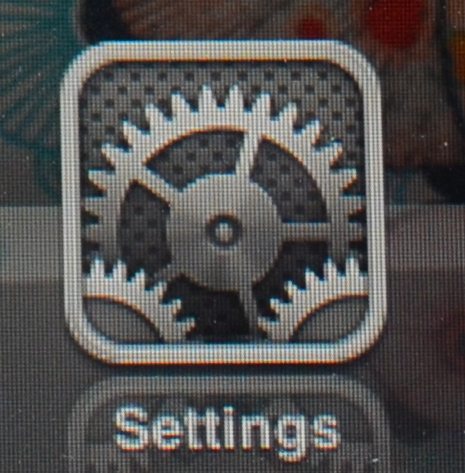
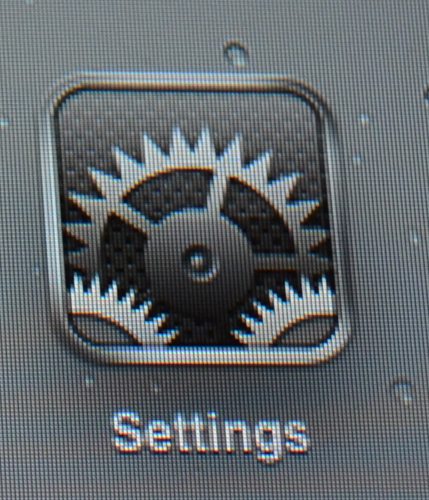
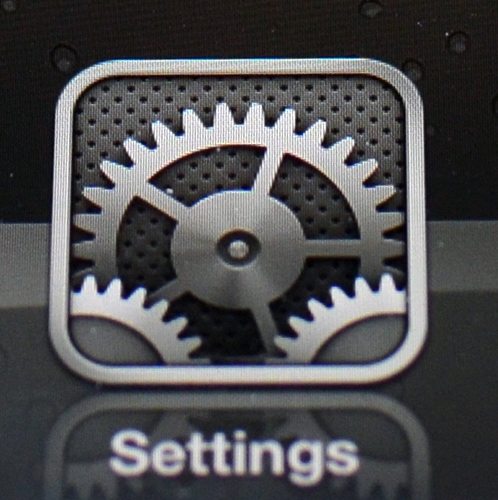
The first thing I noticed when I turned on the iPad mini was the “window screen” effect on the display. I never really noticed the pixels on my iPad or iPad 2, but once I saw the Retina display on my iPhone 4, I always noticed that the iPad’s screen had a gridded appearance; it seemed I was looking at it through a window screen. Although the mini’s screen is the same resolution as the iPad 2’s screen, it is smaller, so it has a higher pixel density than the iPad 2. It’s still 100 pixels/inch less than the iPad’s Retina screen, and the grid is noticeable.
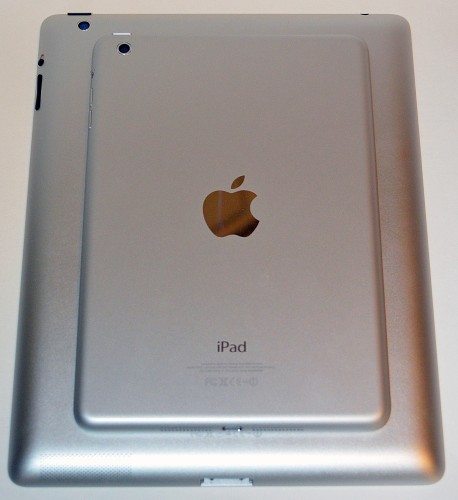
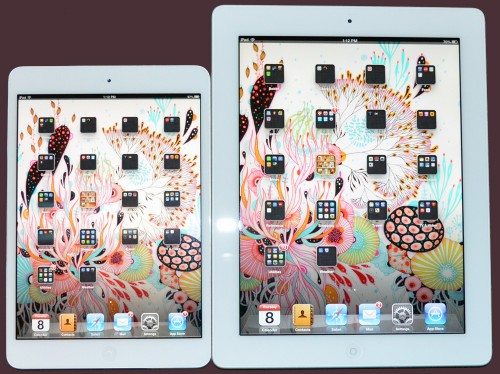 The iPad mini is considerably smaller than the 3rd generation model that I have. The first picture shows the mini laying on the back of the 3rd-gen iPad, and the second shows them side by side. In the top picture, you can also see that the sides of the mini aren’t as sloped as the 3rd-gen iPad’s sides.
The iPad mini is considerably smaller than the 3rd generation model that I have. The first picture shows the mini laying on the back of the 3rd-gen iPad, and the second shows them side by side. In the top picture, you can also see that the sides of the mini aren’t as sloped as the 3rd-gen iPad’s sides.
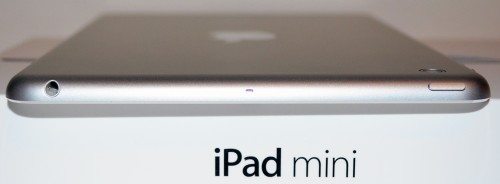

 The iPad has all the same controls as the bigger models. The top has the headphone jack, microphone, and Sleep/Wake button. The bottom has the Lightning connector port. You’ll also notice there are two grills on the bottom. Unlike the older, bigger models, the iPad mini has stereo speakers. The mini does produce more volume than my 3rd-gen iPad, and I don’t need to wrap my hand around the back to redirect the sound to the front like I do with my older iPad. One side has the user-selectable screen-lock/mute slider and the volume buttons. Unlike earlier models, these buttons are metal, not plastic. They are also easy to reach and use.
The iPad has all the same controls as the bigger models. The top has the headphone jack, microphone, and Sleep/Wake button. The bottom has the Lightning connector port. You’ll also notice there are two grills on the bottom. Unlike the older, bigger models, the iPad mini has stereo speakers. The mini does produce more volume than my 3rd-gen iPad, and I don’t need to wrap my hand around the back to redirect the sound to the front like I do with my older iPad. One side has the user-selectable screen-lock/mute slider and the volume buttons. Unlike earlier models, these buttons are metal, not plastic. They are also easy to reach and use.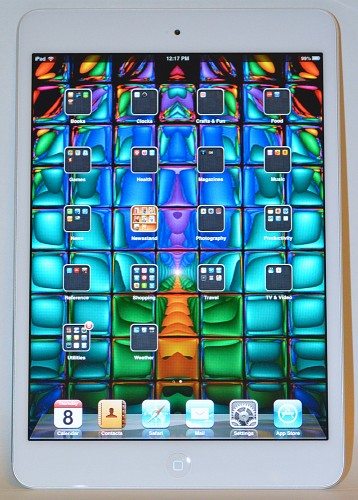 The front of the iPad mini looks a bit different from the 3rd generation. The mini has wide top and bottom bezels, like the previous versions of the iPad do, but the side bezels are narrower. Apple says the touch screen is smart enough to tell the difference between an interaction touch and a thumb that’s stationary while holding the iPad. I find that’s true sometimes, but I also often find the screen jumps to the top of the page when I’m holding the mini in the horizontal orientation because the finger I’ve draped over the top of the mini is touching the screen.
The front of the iPad mini looks a bit different from the 3rd generation. The mini has wide top and bottom bezels, like the previous versions of the iPad do, but the side bezels are narrower. Apple says the touch screen is smart enough to tell the difference between an interaction touch and a thumb that’s stationary while holding the iPad. I find that’s true sometimes, but I also often find the screen jumps to the top of the page when I’m holding the mini in the horizontal orientation because the finger I’ve draped over the top of the mini is touching the screen.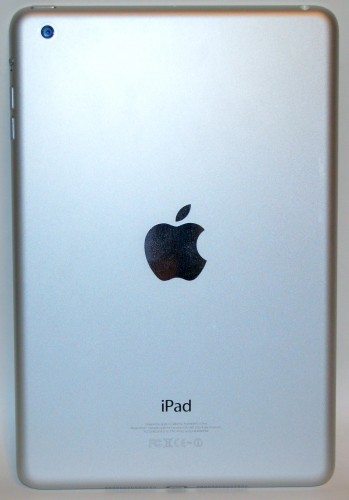 The sides of the iPad mini aren’t as sloped as the sides of the iPad 2 or the 3rd generation model, but it isn’t as squared off as the sides of the original iPad. The back is flat. It’s made of brushed aluminum with a shiny Apple logo in the middle. The metal sides have chamfered edges around the front glass like the iPhone 5 has. (You’ll be able to see the chamfering in an upcoming picture.) It’s very comfortable to hold in hand, with smooth angles and no sharp edges.
The sides of the iPad mini aren’t as sloped as the sides of the iPad 2 or the 3rd generation model, but it isn’t as squared off as the sides of the original iPad. The back is flat. It’s made of brushed aluminum with a shiny Apple logo in the middle. The metal sides have chamfered edges around the front glass like the iPhone 5 has. (You’ll be able to see the chamfering in an upcoming picture.) It’s very comfortable to hold in hand, with smooth angles and no sharp edges.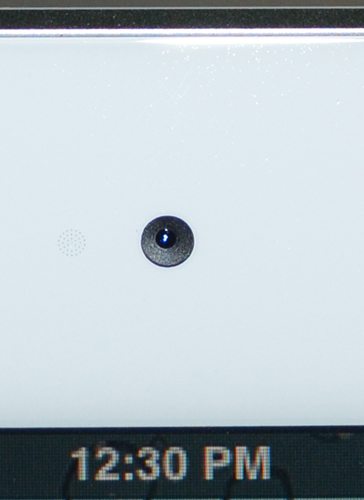
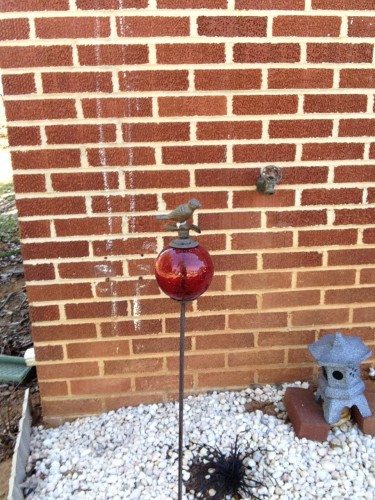
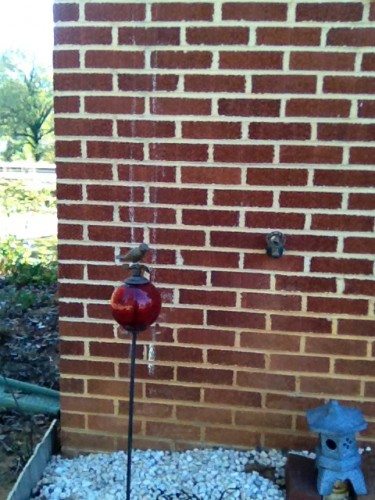
The front has the FaceTime camera. You’ll notice the ambient light sensor just to the left of the camera if you give it a very close look. The sensor is behind the concentric rings of tiny holes. You may not even be able to see the sensor on the black iPad mini. You can use FaceTime over WiFi or cellular service now. Both cameras are also capable of taking still shots and video. (See the technical specifications at the top of this review or Apple’s iPad mini page for more camera details.) I’ve included photos taken with the front cameras of both the mini and the 3rd-gen iPad. Neither has been edited. You’ll notice the photo taken by the mini is bigger and brighter (when you click them to see the full-sized image). The front camera in the mini is a 1.2MP, while the 3rd gen just has what is described as a “VGA-quality” still camera.
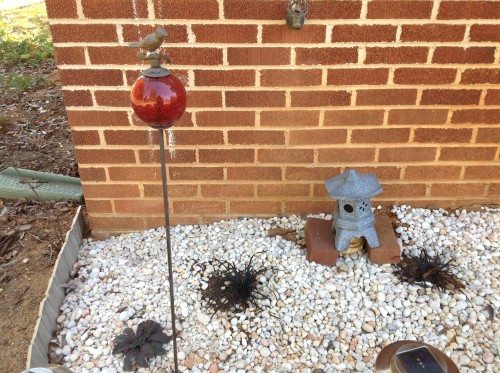
The back iSight camera still doesn’t have a flash unit. The tech specs for both of the mini’s cameras match those of the newest iPad with Retina display, and the back camera also matches the specs for the 3rd-gen iPad. The two pictures taken with the back cameras seem very much the same. These photos weren’t edited.
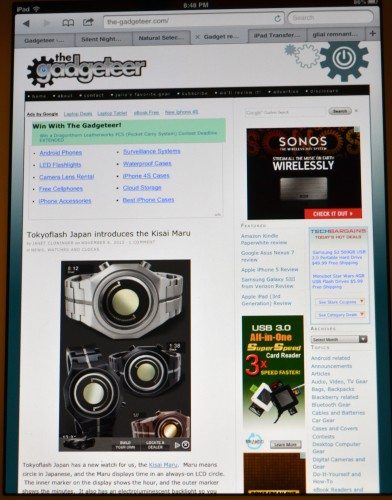
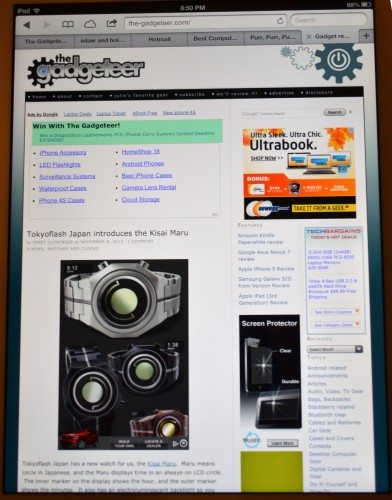
I do notice the lower resolution of the mini’s screen, but the “window screen” appearance tends to disappear when I’m not thinking about it. I can surf or read for hours without eyestrain. Here are two screen shots from the mini (top) and the 3rd-gen iPad (bottom). You can see that both display the same amount of information. Of course, the text is smaller on the mini, but I can usually read it without the need to zoom in. That means I can usually read without the need for panning-and-scanning, which greatly slows down my surfing.
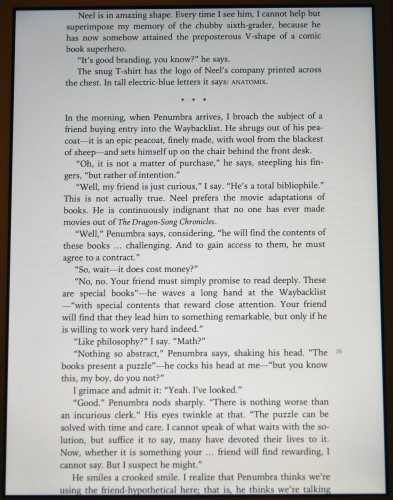
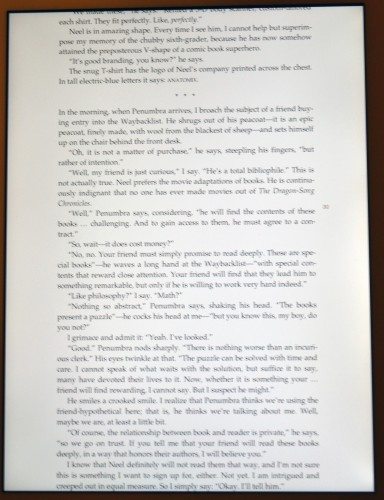
I use iBooks a lot, and you can definitely see a difference in the screens, but I can read easily with the mini. And of course, I can always change the font size in iBooks, if needed.
After I used the mini for a few days, I wished that I had gotten more storage so I could have loaded it up with everything I keep on my 3rd-gen iPad. I had been using the mini most of the time, but I’d have to switch to the big iPad sometimes to use an app that I didn’t have on the mini. I finally decided that I liked the iPad mini enough that I wanted to be able to use it exclusively. I wanted to exchange the iPad mini for one with 32GB, like my 3rd-gen iPad has. Unfortunately, the local Apple store was out of white 32GB units, so I had to “settle” for the 64GB white mini. Now I can load up apps, books, and magazines to my heart’s content.
The Lightning connector is another big difference between the iPad mini and my 3rd-gen iPad. I already had an iPhone 5 and an iPod nano that use the Lightning connector, so I already had a Lightning cable in my charging setup. I don’t have any docks or docking speakers that I use with my iPad, so I don’t have to worry that the mini is incompatible with them.
I’m not saying the iPad mini is perfect. It would need a Retina display to approach perfect, but I do really like the mini. I like that I can stick it in my purse, even my smaller ones, and take it everywhere I go. It’s also small enough that I can put it in a neoprene sleeve and carry it and my Dooney and Bourke wallet in one hand, so I don’t have to take a purse every time I leave the house. After I got the larger capacity mini, I haven’t used the old iPad at all – until I needed to photograph it for this review. I thought I’d use the mini for only reading, if I used it at all, but I haven’t found anything it can’t handle from the set of things I use an iPad for. It works with all the apps I normally use without problems. Most surprisingly, I found it’s easier to type on than the big iPads or the iPhone. With the iPhone, the keyboard is tiny, and I often hit the wrong keys. With the big iPads, I find it hard to stretch my fingers to all the keys because of the crazy way I hold the iPad as I type. Like Goldilocks, I find the iPad mini to be “just right”. I can hold it in my crazy way, and my fingers easily reach all the keys. I’m still doing 2-finger typing, but it’s an easier reach.
Battery life with the mini is just as good as I’ve had with my other iPads. Apple promises 10 hours of use between charges, and I’ve been getting about 11 hours with my iPad mini. I keep my brightness at about 35-40%. I don’t have Bluetooth on, but I do have WiFi on all the time. I spend most of my time reading or surfing, with an occasional game of Bejeweled.
I think the choice to use the non-Retina screen was most likely to keep the cost down. I hope Apple realizes that the iPad mini isn’t just an entry level device for people who want a cheaper tablet for themselves, or for school use, or for their kids. Hopefully, the next release will have a Retina display. I’ll be a very happy camper if it does.
Smart Cover for iPad mini
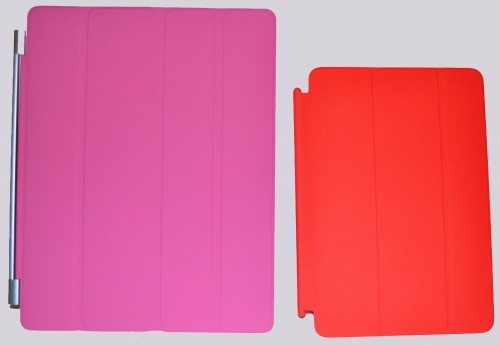 The Smart Cover for the iPad mini is only available in polyurethane. I was surprised to see they charge $39 for the tiny cover – the same price they charge for the polyurethane Smart Cover for the big iPads. The mini cover is available in dark gray, light gray, pink, blue, green, and (Product) Red. I got the red one, as you can see, and it is very red. It’s hard to see in this picture, but the mini cover has only three divisions, while the big one has four. Both covers fold into a stand, but the mini version doesn’t fold as many times. I think they needed to do that so the resulting triangular stand would be large enough to actually support the iPad mini.
The Smart Cover for the iPad mini is only available in polyurethane. I was surprised to see they charge $39 for the tiny cover – the same price they charge for the polyurethane Smart Cover for the big iPads. The mini cover is available in dark gray, light gray, pink, blue, green, and (Product) Red. I got the red one, as you can see, and it is very red. It’s hard to see in this picture, but the mini cover has only three divisions, while the big one has four. Both covers fold into a stand, but the mini version doesn’t fold as many times. I think they needed to do that so the resulting triangular stand would be large enough to actually support the iPad mini.
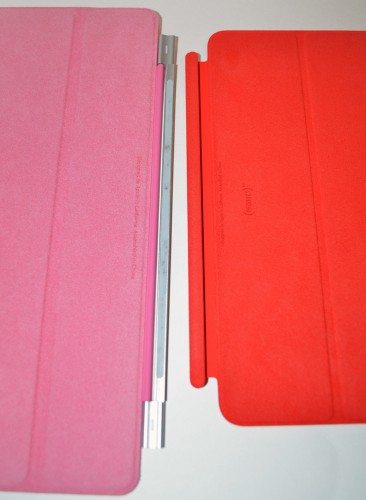 You can see the hinges are different, too. The original version had a metal hinge with magnets buried inside it. The mini version has an all-plastic hinge assembly. Both seem to attach strongly to their iPads. I noticed with the metal hinge there would be blackened areas on the side of the iPad under the hinge. I couldn’t completely remove this darkened smudge, which was apparently caused by the metal hinge. I haven’t used it very long, but I think it’s safe to say the plastic hinge and magnetic assembly probably won’t cause these discolored areas on the side of the iPad mini.
You can see the hinges are different, too. The original version had a metal hinge with magnets buried inside it. The mini version has an all-plastic hinge assembly. Both seem to attach strongly to their iPads. I noticed with the metal hinge there would be blackened areas on the side of the iPad under the hinge. I couldn’t completely remove this darkened smudge, which was apparently caused by the metal hinge. I haven’t used it very long, but I think it’s safe to say the plastic hinge and magnetic assembly probably won’t cause these discolored areas on the side of the iPad mini.
The interior fabric on the mini cover seems a bit fuzzier than on the original version. It’s a microfiber fabric that Apple says will keep your screen clean. I didn’t find that the original Smart Cover kept the screen especially clean. I do notice that the mini version also makes the clean and dirty “stripes” on the touchscreen, just like the original version did.
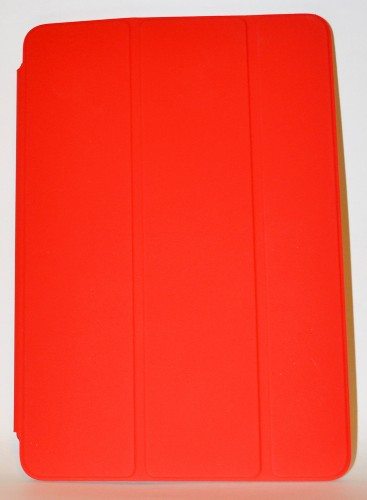 Just like the bigger, original Smart Cover, the mini version has magnets buried inside the left side of the front cover that trigger the sleep/wake function. The mini cover operates this function perfectly, and the cover fits straight and snugly to the iPad mini. It can even hold itself closed when you hold the iPad with the front of the cover facing down.
Just like the bigger, original Smart Cover, the mini version has magnets buried inside the left side of the front cover that trigger the sleep/wake function. The mini cover operates this function perfectly, and the cover fits straight and snugly to the iPad mini. It can even hold itself closed when you hold the iPad with the front of the cover facing down.
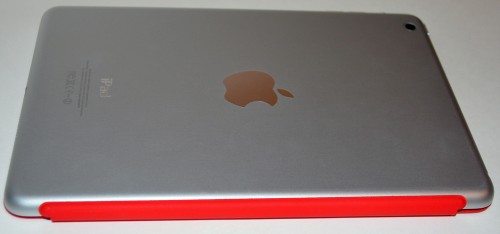 Of course, the back is left unprotected. I have seen some back covers on the market that will protect the aluminum back, but I haven’t ordered one.
Of course, the back is left unprotected. I have seen some back covers on the market that will protect the aluminum back, but I haven’t ordered one.
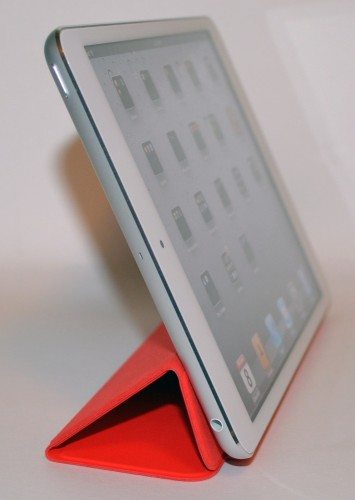 The cover folds up to serve as a horizontal stand for the iPad mini. It works well enough when you have the iPad on a flat surface.
The cover folds up to serve as a horizontal stand for the iPad mini. It works well enough when you have the iPad on a flat surface.
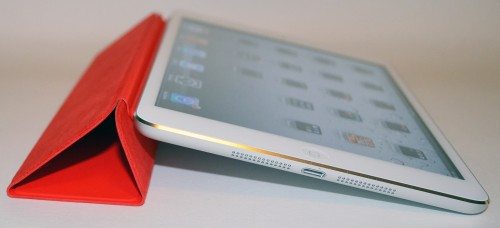
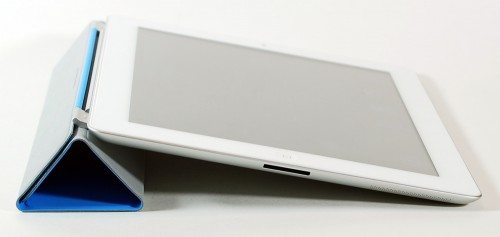
The mini’s typing stand doesn’t seem quite as stable as the stand formed by the original cover. Maybe I was using the original cover incorrectly, but it seems that the original cover supported the iPad 2 a bit better than the small cover supports the mini. In any event, I never use it as a typing stand, so it doesn’t matter much to me.
By the way, the photo of the iPad mini in the typing stand gives you a good look at the shiny, chamfered edge.
With the original cover, I worried that the polyurethane tube that held the metal hinge to the cover would tear with use, but it never showed any wear. Hopefully the large polyurethane strip that attaches the magnet bar to the mini’s cover will prove to be as sturdy.
The iPad mini Smart Cover functions just like the original Smart Cover does. If you like the original, I think you’ll like the new mini version. I just don’t understand why it costs as much as the bigger version.
Apple iPad mini (A17 Pro): Apple Intelligence, 8.3-inch Liquid Retina Display, 128GB, Wi-Fi 6E, 12MP Front/12MP Back Camera, Touch ID, All-Day Battery Life — Starlight
(as of February 15, 2026 07:59 GMT -06:00 - More infoProduct prices and availability are accurate as of the date/time indicated and are subject to change. Any price and availability information displayed on [relevant Amazon Site(s), as applicable] at the time of purchase will apply to the purchase of this product.)Apple iPad 11-inch: A16 chip, 11-inch Model, Liquid Retina Display, 128GB, Wi-Fi 6, 12MP Front/12MP Back Camera, Touch ID, All-Day Battery Life — Blue
(as of February 15, 2026 06:56 GMT -06:00 - More infoProduct prices and availability are accurate as of the date/time indicated and are subject to change. Any price and availability information displayed on [relevant Amazon Site(s), as applicable] at the time of purchase will apply to the purchase of this product.)Product Information
| Price: | iPad mini WiFi models start at $329 for the 16GB model; $429 for 32GB; $529 for 64GB. The Smart Cover is $39. |
| Manufacturer: | Apple |
| Pros: |
|
| Cons: |
|

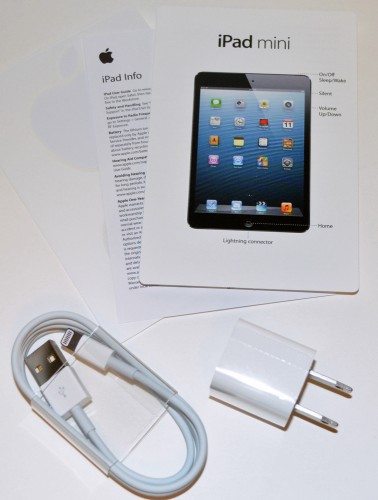
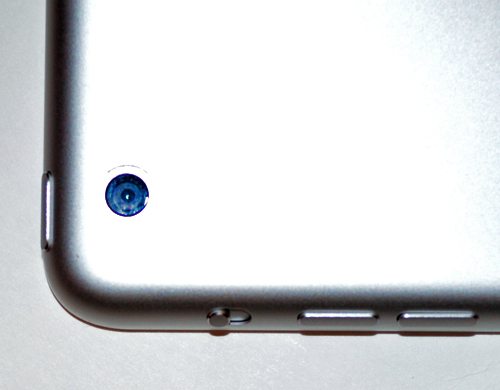
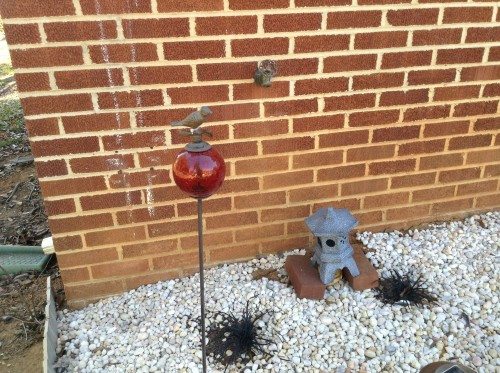


Gadgeteer Comment Policy - Please read before commenting
Janet, with your testing does the iPad mini perform as well as the iPad 3? I’m thinking of an iPad 4 when the LTE one is released. I carry a larger bag an have no problem with the iPad size in my bag now.
Jake, I’ve noticed the mini takes 1 or 2 seconds longer to connect to a web page. Other than the non-Retina display screen, that’s about the only (slight) negative I’ve noticed for the mini. I’m not a gamer, Bejeweled is about it for me, so I can’t say how the mini would perform for a hardcore gamer. All the apps I’ve tried – calendar, mail, contacts, iBooks, Zinio, Next Issue, Sky Grid, Zite, various magazines in Newsstand, Numbers, the Weather Channel app, and several others – all work just as well on the mini as on the 3rd-gen iPad for me.
Janet, thank you. What is the usable memory size on the 16GB and 64GB models. This is particularly important since it has no expandable memory. A recent article on The Gadgeteer revealed that the Microsoft Surface 32GB only had 16GB available memory and 45GB for the 64GB version.
@Richard I have 57.5GB available on my 64GB mini. I don’t remember what the 16GB had. I checked the amount of space left on a 32GB iPad with iOS 6; it has 28.6 available. I would guess the 16GB model would have about 13-13.5GB. iOS has a much smaller footprint than Windows 8.
Does anyone know if the iPad mini LTE version will use the same micro-sim size that the full-size iPad LTE uses?
It would be most convenient to be able to swap the same sim between both iPads 😉
@anson According to Apple’s comparison page, the iPad mini uses a “Nano-SIM. iPad mini is not compatible with existing micro-SIM cards.” http://www.apple.com/ipad/compare/
@Janet- grrrrrr.
I’m waiting for my 64GB LTE version to arrive. Super excited!
@Janet – That wallpaper with the squares looks awesome! Can you email me that?
Does the retina display improve readability under an umbrella at the beach over the Ipad mini?
@Bob Adams I live hours from the beach, so I have no way of knowing. I can read both while sitting in my car on a sunny day.
My nephew is asking for the IPAD Mini but I am not sure if we need to wait for new or not…